Introduction
Welcome to the world of cybersecurity! In this digital age, the security of our online information has become more important than ever. Every day, hackers and cybercriminals are coming up with new ways to exploit vulnerabilities and breach our personal data. This has created a tremendous demand for skilled professionals who can protect our digital assets and ensure the integrity of our online activities.
In this article, we will explore the different pathways to a career in cybersecurity and discuss the educational requirements needed to enter this exciting field. Whether you’re just starting to consider a career in cybersecurity or looking to advance your existing skills, this article will provide you with a comprehensive overview of the degrees and certifications you may need.
Cybersecurity is a vast and ever-evolving field that encompasses various disciplines. From protecting computer networks and systems to investigating cybercrimes and implementing security protocols, cybersecurity professionals play a critical role in safeguarding digital information. With the increasing prevalence of cyber threats, the demand for cybersecurity experts continues to grow across industries and sectors.
As we dive deeper into the world of cybersecurity, we will explore the importance of this field and the different types of cybersecurity jobs available. From entry-level positions to specialized roles, there are numerous opportunities to build a rewarding career in this dynamic industry. Whether you’re interested in becoming a cybersecurity analyst, digital forensic expert, or ethical hacker, there’s a wide range of roles to suit your interests and expertise.
In the following sections, we will discuss the various educational pathways that can lead to a career in cybersecurity. From associate’s degrees to master’s degrees, each level of education offers unique benefits and opportunities for specialization. Additionally, we will explore the importance of certifications in the cybersecurity field and how they can enhance your skills and employability.
So, whether you’re passionate about protecting critical infrastructure from cyber threats or want to contribute to the fight against online crime, a career in cybersecurity offers endless possibilities. Let’s embark on this journey together and discover the educational requirements and pathways that can set you on the path to success in the exciting world of cybersecurity.
Overview of Cybersecurity
Cybersecurity refers to the practice of protecting computer systems, networks, software, and data from unauthorized access or malicious attacks. It encompasses a wide range of techniques and measures designed to safeguard sensitive information and ensure the privacy, availability, and integrity of digital assets.
With the increasing prevalence of online threats, cybersecurity has become a critical concern for individuals, businesses, and governments alike. From data breaches and ransomware attacks to identity theft and phishing scams, the potential risks and impacts of cyber threats are significant. As technology continues to advance and more aspects of our lives become digitized, the importance of cybersecurity cannot be overstated.
Cybersecurity professionals employ various strategies and technologies to protect against cyber threats. This includes implementing firewalls, encryption protocols, and intrusion detection systems to secure computer networks and data. They also conduct risk assessments, vulnerability scans, and penetration testing to identify and address potential weaknesses in systems and processes. In addition, cybersecurity experts play a crucial role in incident response, mitigating the damage caused by cyber attacks and restoring normal operations.
The field of cybersecurity is continually evolving as new threats and attack vectors arise. Consequently, cybersecurity professionals must stay updated with the latest trends and technologies, continuously improving their skills and knowledge. This dynamic nature of the field makes it exciting and challenging, providing opportunities for continuous learning and professional growth.
Furthermore, cybersecurity is not limited to solely protecting organizations’ internal systems. It also extends to securing critical infrastructure, such as power grids, transportation systems, and healthcare networks. A breach in any of these systems can have far-reaching consequences, affecting public safety and national security. Therefore, cybersecurity professionals work closely with government agencies and private sector organizations to develop robust security frameworks and response strategies.
Ultimately, the goal of cybersecurity is to create a secure and trustworthy digital environment. By safeguarding systems, networks, and data, cybersecurity professionals help to maintain the confidentiality, integrity, and availability of information. Their efforts are crucial in protecting individuals’ privacy, safeguarding corporate assets, and ensuring the stability and security of the digital landscape as a whole.
Importance of Cybersecurity
In today’s interconnected world, the importance of cybersecurity cannot be overstated. As our reliance on technology increases, so does the risk of cyber threats and attacks. Here are some key reasons why cybersecurity is of utmost importance:
Protection of Sensitive Information: With the rising number of data breaches and hacking incidents, protecting sensitive information has become critical. Cybersecurity measures help safeguard personal data, financial records, intellectual property, and sensitive corporate information from unauthorized access or theft.
Mitigation of Financial Losses: Businesses and individuals can suffer significant financial losses due to cyber attacks. The costs associated with data breaches, downtime, reputation damage, legal consequences, and recovery can be astronomical. Implementing robust cybersecurity measures helps mitigate such financial losses by preventing or minimizing the impact of cyber attacks.
Preservation of Trust and Reputation: Maintaining the trust and confidence of customers is paramount for businesses. A single data breach or security incident can severely damage a company’s reputation and erode customer trust. By prioritizing cybersecurity, organizations demonstrate their commitment to protecting customer data, which strengthens trust and enhances their reputation.
Protection of National Security: Cyber threats extend beyond individual organizations and can have broader implications for national security. Critical infrastructure, government systems, and military networks are prime targets for cyber attacks. Effective cybersecurity measures help safeguard these assets, ensuring the stability and security of a nation.
Privacy Protection: Cybersecurity plays a crucial role in safeguarding individuals’ privacy in the digital world. With the growing amount of personal information shared online, cybercriminals can exploit vulnerabilities to invade privacy, commit identity theft, or conduct surveillance. By implementing robust cybersecurity measures, individuals can protect their privacy and personal information from unauthorized access or misuse.
Business Continuity: In today’s highly digitized environment, businesses heavily rely on technology for their day-to-day operations. Any disruption or compromise in systems and networks can lead to significant downtime, loss of productivity, and financial impact. Robust cybersecurity measures help ensure business continuity by preventing and mitigating cyber threats that can disrupt normal operations.
Protection against Emerging Threats: Cyber threats are constantly evolving, with hackers finding new ways to exploit vulnerabilities. By investing in cybersecurity, organizations can stay ahead of these emerging threats, implementing proactive measures to identify and address potential risks before they can be exploited.
Overall, cybersecurity is essential to protect sensitive information, mitigate financial losses, preserve trust and reputation, maintain national security, protect privacy, ensure business continuity, and stay vigilant against emerging threats. By prioritizing cybersecurity, individuals, businesses, and governments can navigate the digital landscape with confidence, knowing that their digital assets and information are well protected.
Types of Cybersecurity Jobs
The field of cybersecurity offers a wide range of opportunities for individuals with the right skills and expertise. As organizations strive to protect their digital assets and data from cyber threats, various job roles have emerged within the cybersecurity domain. Here are some common types of cybersecurity jobs:
- Cybersecurity Analyst: Cybersecurity analysts play a crucial role in monitoring and analyzing security vulnerabilities, incidents, and threats. They conduct risk assessments, perform security audits, and develop strategies to protect computer systems and networks. Their responsibilities also include incident response, investigating security breaches, and implementing security measures to prevent future attacks.
- Security Engineer: Security engineers design and implement secure systems and networks. They evaluate system architectures, develop security protocols, and configure firewalls and intrusion detection systems. They also collaborate with software engineers to integrate security features into applications and perform vulnerability assessments to identify and address potential weaknesses.
- Penetration Tester: Penetration testers, also known as ethical hackers, conduct controlled cyber attacks to identify vulnerabilities and weaknesses in computer systems and networks. They simulate real-world cyber attacks to assess the effectiveness of security measures and provide recommendations for improvement. Their work helps organizations identify and fix vulnerabilities before malicious hackers can exploit them.
- Security Architect: Security architects design and implement comprehensive security architectures for organizations. They develop security policies, standards, and guidelines to ensure the protection of data and systems. They also assess and select security technologies, such as encryption tools and access control systems, to meet the organization’s specific needs.
- Incident Responder: Incident responders are responsible for handling and managing security incidents. They investigate security breaches, analyze the extent of the damage, and develop strategies to mitigate the impact. They coordinate with other relevant teams to contain the incident, recover affected systems, and prevent future occurrences.
- Forensic Analyst: Forensic analysts specialize in data recovery and analysis following a security incident. They use forensic tools and techniques to collect and analyze digital evidence related to cybercrimes. Their findings support incident investigations, legal proceedings, and the identification of vulnerabilities or gaps in security systems.
These are just a few examples of the diverse job roles within the cybersecurity field. Other roles include security consultants, vulnerability analysts, network security specialists, and compliance officers. Each job requires a unique skill set and expertise, and individuals can specialize in different areas depending on their interests and career goals.
It’s important to note that the cybersecurity field is continually evolving, and new job roles emerge as technology advances and threats evolve. Therefore, staying up-to-date with industry trends and continuously developing new skills is essential for a successful and fulfilling career in cybersecurity.
Pathways to Cybersecurity
There are various pathways that can lead to a career in cybersecurity, offering flexibility to individuals with different educational backgrounds and experience levels. Here are some common pathways to consider:
- Academic Degrees: Pursuing academic degrees in cybersecurity or related fields is a popular pathway. Many universities and colleges offer degree programs specifically focused on cybersecurity. These programs provide a comprehensive understanding of cybersecurity principles, technologies, and industry best practices. Degrees in computer science, information technology, or computer engineering can also serve as a foundation for a career in cybersecurity.
- Cybersecurity Bootcamps: In recent years, cybersecurity bootcamps have gained popularity as an intensive and practical training option. These bootcamps offer focused and accelerated programs that equip students with the essential skills needed for entry-level cybersecurity roles. Bootcamps often provide hands-on experience, mentoring, and networking opportunities to jumpstart a career in cybersecurity.
- Entry-Level IT Positions: Many professionals transition into cybersecurity from entry-level positions in information technology (IT). Building a foundation of knowledge and experience in IT roles, such as system administration or network support, can provide a solid entry point to transition into cybersecurity positions. IT roles can offer exposure to various technologies and systems, which are valuable in understanding security vulnerabilities and threats.
- Self-Study and Certifications: For individuals looking to enter the field without a formal degree, self-study and certifications offer an alternative pathway. There are numerous industry-recognized certifications available, such as Certified Information Systems Security Professional (CISSP), Certified Ethical Hacker (CEH), and CompTIA Security+. Obtaining these certifications demonstrates competence in specific areas of cybersecurity and can enhance employability.
- Internships and Entry-Level Positions: Securing internships or entry-level positions in cybersecurity can provide valuable hands-on experience and industry exposure. Many organizations offer internship programs that allow individuals to gain practical skills and knowledge while working alongside cybersecurity professionals. These experiences can be stepping stones to more advanced roles in the field.
- Continuing Education and Professional Development: Continuous learning and professional development are crucial in the rapidly evolving field of cybersecurity. Professionals can enhance their skills and knowledge through workshops, conferences, webinars, and online learning platforms. Staying updated with the latest industry trends and technologies is vital to stay competitive and excel in the cybersecurity field.
It’s important to remember that cybersecurity is a highly specialized and technical field. While formal education and certifications can provide a strong foundation, hands-on experience, problem-solving skills, and a passion for technology are essential for success in this field. Employers often value practical experience, so participating in cybersecurity competitions, contributing to open-source projects, or working on personal cybersecurity projects can help bolster a resume and demonstrate skills to potential employers.
Regardless of the pathway chosen, continuous learning, staying updated with the latest cybersecurity trends, and networking with professionals in the field are crucial for long-term success in the dynamic and ever-evolving world of cybersecurity.
Associate’s Degree in Cybersecurity
An associate’s degree in cybersecurity is a two-year undergraduate program that provides students with a solid foundation in the principles and practices of cybersecurity. It is an excellent option for individuals looking to enter the cybersecurity field quickly or as a stepping stone to further education. Here are some key aspects of an associate’s degree in cybersecurity:
Curriculum: The curriculum of an associate’s degree in cybersecurity typically covers a range of topics, including cybersecurity fundamentals, network security, ethical hacking, digital forensics, secure coding, and information assurance. Students learn about the principles and concepts underlying cybersecurity, along with practical skills needed to secure computer systems, networks, and data.
Hands-on Training: Associate’s degree programs often provide hands-on training, allowing students to apply theoretical knowledge to real-world scenarios. They may have access to cybersecurity labs, simulated environments, or virtualization technologies to practice implementing security measures, conducting vulnerability assessments, and responding to security incidents.
Industry-Relevant Certifications: Some associate’s degree programs may incorporate industry-recognized certifications as part of the curriculum. These certifications, such as CompTIA Security+ or EC-Council Certified Ethical Hacker (CEH), can enhance students’ employability and credibility in the job market.
Career Opportunities: With an associate’s degree in cybersecurity, graduates can pursue entry-level positions in the cybersecurity field. They may be eligible for roles such as cybersecurity analyst, network security technician, information security specialist, or cybersecurity support technician. This degree provides the foundational knowledge and skills needed to start a career in cybersecurity and can serve as a stepping stone for further advancement.
Continuing Education: While an associate’s degree can provide a solid foundation, individuals seeking more advanced and specialized roles in cybersecurity may consider pursuing further education, such as a bachelor’s degree or professional certifications. Many associate’s degree programs offer transfer options, allowing students to continue their education and earn a higher degree.
Benefits: There are several benefits to obtaining an associate’s degree in cybersecurity. Firstly, it is a relatively shorter and more cost-effective option compared to a bachelor’s degree. It allows individuals to enter the workforce sooner and start building their careers. Additionally, it provides a broad understanding of cybersecurity principles, which can be applied across various roles and industries.
Limitations: It’s important to note that an associate’s degree may have limitations when it comes to advanced roles and career progression in cybersecurity. Some employers may prefer candidates with higher degrees or more extensive experience for senior positions. However, with continuous learning, professional development, and practical experience, individuals with an associate’s degree can still advance their careers in the cybersecurity field.
An associate’s degree in cybersecurity offers a solid foundation in a relatively shorter timeframe, making it an attractive option for those looking to gain entry-level positions in the field. It equips students with the fundamental knowledge and skills needed to start a career in cybersecurity, providing a stepping stone for further education and professional growth. With the increasing demand for cybersecurity professionals, graduates with an associate’s degree can find many opportunities in various industries to contribute to the vital task of protecting digital assets and information.
Bachelor’s Degree in Cybersecurity
A bachelor’s degree in cybersecurity is a four-year undergraduate program that delves deeper into the field of cybersecurity, providing students with comprehensive knowledge and skills. It offers a more in-depth understanding of cybersecurity principles, technologies, and practices, making it an ideal choice for individuals seeking a broader scope and better career prospects in the cybersecurity field. Here are some key aspects of a bachelor’s degree in cybersecurity:
Curriculum: The curriculum of a bachelor’s degree program in cybersecurity covers a wide range of subjects, including network security, cryptography, secure software development, cyber laws and regulations, digital forensics, and ethical hacking. It provides students with a solid foundation in cybersecurity principles and practices, along with opportunities for specialization in areas such as incident response, secure coding, or risk management.
Advanced Technical Skills: A bachelor’s degree program in cybersecurity focuses not only on theoretical knowledge but also on developing technical skills. Students gain hands-on experience with various tools, technologies, and methodologies used in the field. They learn to implement security measures, conduct vulnerability assessments, perform risk analysis, develop secure software, and investigate cybercrimes.
Capstone Projects: Many bachelor’s degree programs require students to complete capstone projects, where they can apply their knowledge and skills to real-world scenarios. These projects involve solving complex cybersecurity problems or developing innovative solutions to address emerging threats. Capstone projects provide valuable practical experience and the opportunity to demonstrate proficiency in the field.
Industry Connections and Internships: Bachelor’s degree programs often have partnerships with industry organizations, providing students with opportunities for internships, cooperative education, or other work experiences. These connections help students gain real-world exposure, make professional contacts, and enhance their employability upon graduation.
Career Opportunities: Graduates with a bachelor’s degree in cybersecurity can pursue a wide range of exciting career opportunities. They can work as cybersecurity analysts, security engineers, penetration testers, security consultants, or risk assessors. The broader and more specialized knowledge gained through a bachelor’s degree opens doors to more advanced roles and positions with greater responsibilities.
Graduate Studies: A bachelor’s degree in cybersecurity can also serve as a solid foundation for further education. Graduates can choose to pursue a master’s degree or research in cybersecurity or related fields, which can open up even more advanced positions and opportunities for research and leadership roles in academia, industry, or government organizations.
Benefits: A bachelor’s degree in cybersecurity provides a comprehensive education and prepares individuals for a wide range of cybersecurity roles. It offers a deeper understanding of cybersecurity principles, exposure to advanced technologies, and the development of critical thinking and problem-solving skills. With a bachelor’s degree, graduates are well-positioned to enter the cybersecurity field with competitive salaries and opportunities for career growth.
Limitations: Completing a bachelor’s degree program requires a significant investment of time, effort, and financial resources. For some individuals, the longer duration of a bachelor’s degree program may be a disadvantage if they are looking to enter the workforce quickly. Additionally, the field of cybersecurity is fast-paced and constantly evolving. Therefore, continuous learning and professional development are essential even after obtaining a bachelor’s degree.
A bachelor’s degree in cybersecurity offers a comprehensive education, technical skills, and numerous career opportunities in the rapidly expanding field of cybersecurity. It provides individuals with a deep understanding of cybersecurity principles and practices, preparing them to tackle complex cybersecurity challenges and make a meaningful impact on securing digital assets and information.
Master’s Degree in Cybersecurity
A master’s degree in cybersecurity is an advanced graduate program that provides individuals with a high level of expertise and specialization in the field of cybersecurity. It offers in-depth knowledge, advanced technical skills, and strategic insights into cybersecurity practices and policies. Here are some key aspects of a master’s degree in cybersecurity:
Advanced Curriculum: The curriculum of a master’s degree program in cybersecurity focuses on advanced topics and specialized areas of cybersecurity. Students delve into subjects such as advanced cryptography, secure cloud computing, network intrusion detection, cyber threat intelligence, and incident response. The coursework is designed to enhance critical thinking, problem-solving, and analytical skills necessary to address complex cybersecurity challenges.
Research Opportunities: Many master’s degree programs offer research opportunities, allowing students to contribute to cutting-edge cybersecurity research. Students can work closely with faculty members, industry professionals, or government agencies to explore emerging technologies, develop innovative solutions, and advance the field of cybersecurity through research projects.
Practical Experience: Master’s degree programs often include practical components such as internships, cooperative education, or industry projects. These experiences provide students with the opportunity to apply theoretical knowledge, gain real-world exposure, and develop industry-relevant skills. Students may collaborate with industry partners on solving complex cybersecurity problems or implementing security solutions.
Specialization Options: Master’s degree programs offer opportunities for specialization within the field of cybersecurity. Students can focus on areas such as digital forensics, network security, secure software development, cyber risk management, or cyber policy. Specialization allows individuals to develop expertise in specific domains, making them highly valuable and sought-after professionals in their chosen area.
Industry Connections: Many master’s degree programs have strong ties to industry, enabling students to network with cybersecurity professionals and gain insights from industry experts. These connections often lead to internship, job placement, or collaborative research opportunities, enhancing students’ exposure to real-world cybersecurity challenges and expanding their professional networks.
Career Advancement: Graduates with a master’s degree in cybersecurity are well-positioned for career advancement in the field. They can pursue senior-level positions such as cybersecurity managers, security architects, digital forensic analysts, or cyber threat analysts. A master’s degree not only demonstrates a high level of expertise but also enhances critical thinking, leadership, and strategic decision-making abilities.
Doctoral Program Opportunities: A master’s degree in cybersecurity can serve as a foundation for further academic pursuits. Graduates interested in research, academia, or specialized roles may consider pursuing a doctoral degree in cybersecurity or a related field. A doctoral degree opens up opportunities for advanced research, teaching positions, or high-level leadership roles in academia, industry, or government organizations.
Benefits: A master’s degree in cybersecurity equips individuals with advanced knowledge, specialized skills, and strategic perspectives necessary to address complex cybersecurity challenges. It enhances their career prospects, increases earning potential, and positions them for leadership roles in the cybersecurity field. The depth of knowledge gained through a master’s degree program allows graduates to make significant contributions to the advancement of cybersecurity practices.
Limitations: Pursuing a master’s degree requires a significant commitment of time, effort, and financial resources. It is a rigorous program that demands dedication, self-motivation, and the ability to handle complex subject matter. Additionally, some advanced roles in cybersecurity may not require a master’s degree, and individuals can gain relevant experience and progress in their careers through other pathways.
A master’s degree in cybersecurity provides individuals with an advanced understanding of the field, specialized skills, and strategic perspectives needed to tackle the most challenging cybersecurity issues. It opens doors to senior-level positions, research opportunities, and leadership roles, making it an excellent choice for cybersecurity professionals looking to advance their careers and contribute to the evolving landscape of cybersecurity.
Certifications in Cybersecurity
Certifications in cybersecurity are valuable credentials that validate an individual’s knowledge and skills in specific areas of cybersecurity. They demonstrate expertise in various domains and serve as proof of competence to employers and clients. Cybersecurity certifications are widely recognized in the industry and can enhance employability and career advancement. Here are some important certifications in cybersecurity:
- CompTIA Security+: This entry-level certification covers foundational cybersecurity concepts and best practices. It validates the ability to secure systems, networks, and data, and demonstrates knowledge of threat management, cryptography, and risk assessment.
- Certified Information Systems Security Professional (CISSP): CISSP is a globally recognized certification for experienced cybersecurity professionals. It covers a wide array of topics, including security and risk management, asset security, security architecture, and engineering. CISSP demonstrates a deep understanding of cybersecurity principles and is highly valued by employers.
- Certified Ethical Hacker (CEH): CEH certifies individuals in ethical hacking techniques and methodologies. It teaches the skills needed to identify vulnerabilities, exploit systems ethically, and assess the security posture of organizations. CEH is relevant for professionals involved in penetration testing and vulnerability assessment.
- GIAC Security Essentials (GSEC): GSEC is an entry-level certification that covers a broad range of security topics, including network security, access controls, cryptography, and incident response. It demonstrates the ability to implement and manage security controls across various domains.
- CompTIA CySA+: The Cybersecurity Analyst (CySA+) certification focuses on threat detection and response. It validates the ability to analyze data and identify vulnerabilities, threats, and risks. It is suitable for individuals in roles such as cybersecurity analysts, vulnerability analysts, or threat intelligence analysts.
- Certified Information Systems Auditor (CISA): CISA certification is specific to IT audit and focuses on auditing, control, and security of information systems. It demonstrates expertise in assessing vulnerabilities, implementing controls, and conducting IT audits in alignment with industry standards.
- Offensive Security Certified Professional (OSCP): OSCP is an advanced certification that focuses on practical skills in offensive security. It requires successfully completing a hands-on penetration testing challenge and demonstrates proficiency in identifying and exploiting vulnerabilities.
- Certified Information Privacy Professional (CIPP): CIPP focuses on privacy regulations and best practices. It is relevant for professionals involved in privacy compliance, risk assessment, and data protection. CIPP certifications are available for different regions and sectors, addressing specific privacy laws and policies.
These certifications are just a few examples of the wide range of cybersecurity certifications available. Each certification validates proficiency in specific areas of cybersecurity and targets different roles or domains within the field. It is important to choose certifications that align with your career goals and interests.
Cybersecurity certifications provide several benefits. They enhance professional credibility, validate knowledge and skills, and increase employability. Employers often prioritize candidates with relevant certifications when hiring for cybersecurity roles. Additionally, certifications require ongoing education and professional development, ensuring that cybersecurity professionals stay updated with the latest trends and technologies in the field.
It’s worth noting that while certifications are valuable credentials, they are not a substitute for experience and practical skills. Employers often seek a combination of certifications, relevant experience, and continuous learning when evaluating candidates for cybersecurity positions. Therefore, it’s important to supplement certifications with hands-on experience, ongoing learning, and practical application of cybersecurity knowledge.
In summary, certifications in cybersecurity provide a recognized validation of skills and knowledge in specific areas. They offer numerous benefits for cybersecurity professionals, including increased employability, professional credibility, and continuous learning. Choosing the right certifications can enhance career prospects and open doors to exciting opportunities within the dynamic and ever-expanding field of cybersecurity.
Conclusion
Cybersecurity is a critical field in today’s digital landscape, where the protection of sensitive data, networks, and systems is of utmost importance. As cyber threats continue to evolve, the demand for skilled cybersecurity professionals continues to grow. Throughout this article, we have explored the various pathways to a career in cybersecurity, including educational degrees, certifications, and practical experience.
From associate’s degrees to master’s degrees, academic programs offer a structured and comprehensive approach to learning the principles and practices of cybersecurity. These degrees provide a solid foundation and can equip individuals with the knowledge and skills needed to enter the field and pursue various cybersecurity roles.
In addition, certifications in cybersecurity validate specific skills and knowledge, demonstrating expertise in a particular area. These certifications increase employability and enhance professional credibility in the eyes of employers and clients.
While formal education and certifications are important, hands-on experience and continuous learning are equally essential in the cybersecurity field. Internships, cooperative education, and practical projects allow individuals to apply theoretical knowledge to real-world scenarios, gaining invaluable experience in the process.
It’s important to note that the field of cybersecurity is constantly evolving, with new threats and technologies emerging regularly. Therefore, staying updated with the latest trends, participating in professional development activities, and continuously enhancing skills are crucial for long-term success.
Whether you are interested in becoming a cybersecurity analyst, ethical hacker, security engineer, or any other role within the field, embarking on a pathway in cybersecurity offers vast opportunities. With the increasing demand for cybersecurity professionals across industries and sectors, job prospects and career advancement potential are promising.
In conclusion, a career in cybersecurity offers not only a rewarding and challenging path but also the opportunity to make a significant impact in safeguarding digital assets and ensuring the security of our interconnected world. By pursuing the right educational pathways, obtaining certifications, gaining hands-on experience, and staying continuously updated, individuals can position themselves for a successful and fulfilling career in the fast-paced and ever-evolving field of cybersecurity.

























